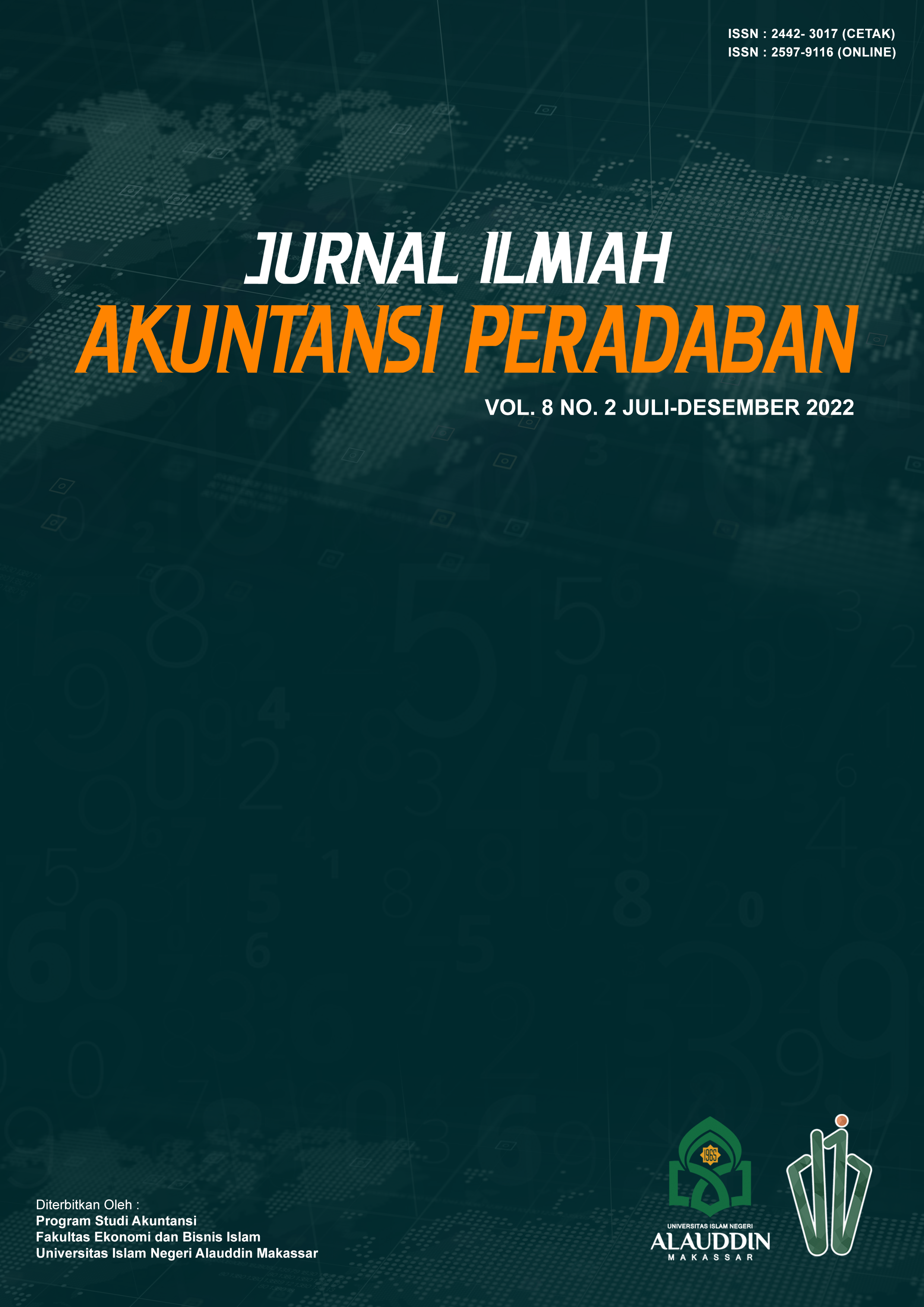NIAT PERILAKU KEPATUHAN PAJAK MUSLIM WILAYAH SULSELBRATA DI TENGAH PANDEMIK COVID-19
Abstract
Konsep TPB adalah merupakan sebuah teori yang mampu menjelaskan perilaku wajib pajak. TPB dapat disintesa dengan nilai-nilai islam. Tujuan penelitian ini yaitu untuk menguji niat perilaku kepatuhan wajib pajak muslim Sulselbrata di tengah pandemic covid 19 yang dihubungkan dengan akhlaq perilaku pajak, tax amnesty dan e-sistem pajak. Sampel penelitian ini sebanyak 515 responden, menggunakan purposive dan snow ball sampling. Data diolah menggunakan regresi berganda. Hasil penelitian membuktikan bahwa akhlaq perilaku pajak dan e-sistem pajak menjadi faktor yang menentukan niat, sementara tax amnesty bukan faktor penentu niat wajib pajak muslim Sulselbrata. Implikasi penelitian ini dari segi teori, memberikan sumbangan pemikiran untuk mengarah ke penciptaan teori baru yakni perilaku kepatuhan wajip pajak dalam konsep Islam. Segi praktisi memberikan informasi kepada pengambil kebijakan perpajakan dalam mendorong kepatuhan pajak dengan menggunakan pendekatan spiritual sesuai keyakinan wajib pajak.
Kata Kunci : Akhlaq, Niat, Kepatuhan Pajak
TPB concept is a theory that is able to explain the behavior of taxpayers. TPB can be synthesized with Islamic values. The purpose of this study is to examine the behavioral niyyah of Muslim taxpayers from Sulselbrata in the midst of Covid-19 pandemic, which is associated with tax behavior, tax amnesty and the e-tax system. The sample of this study were 515 respondents, used purposive and snow ball sampling. Data analiyzed with multiple regression. The results of the study prove that the akhlaq (morals) of tax behavior and e-tax system are the determining factors of niyyah, while tax amnesty is not a determining of the niyyah of Muslim taxpayers in Sulselbrata. The implication of this study on the terms of theory is to contribute ideas in creating a new theory, namely the behavior of taxpayer compliance in the Islamic concept. On the practitioner side, this study provides information to tax policy makers in encouraging tax compliance by using a spiritual approach according to the taxpayer's beliefs.
Keyword: Akhlaq, niyyah, tax compliance.
Copyright (c) 2022 Lince Bulutoding

This work is licensed under a Creative Commons Attribution 4.0 International License.
Authors who publish with this journal agree to the following terms:
- Authors retain copyright and grant the journal right of first publication with the work simultaneously licensed under a Creative Commons Attribution License that allows others to share the work with an acknowledgement of the work's authorship and initial publication in this journal.
- Authors are able to enter into separate, additional contractual arrangements for the non-exclusive distribution of the journal's published version of the work (e.g., post it to an institutional repository or publish it in a book), with an acknowledgement of its initial publication in this journal.
- Authors are permitted and encouraged to post their work online (e.g., in institutional repositories or on their website) prior to and during the submission process, as it can lead to productive exchanges, as well as earlier and greater citation of published work (See The Effect of Open Access).
Under the following terms of Creative Commons:
-
Attribution — You must give appropriate credit, provide a link to the license, and indicate if changes were made. You may do so in any reasonable manner, but not in any way that suggests the licensor endorses you or your use.
-
NonCommercial — You may not use the material for commercial purposes.
- No additional restrictions — You may not apply legal terms or technological measures that legally restrict others from doing anything the license permits.


